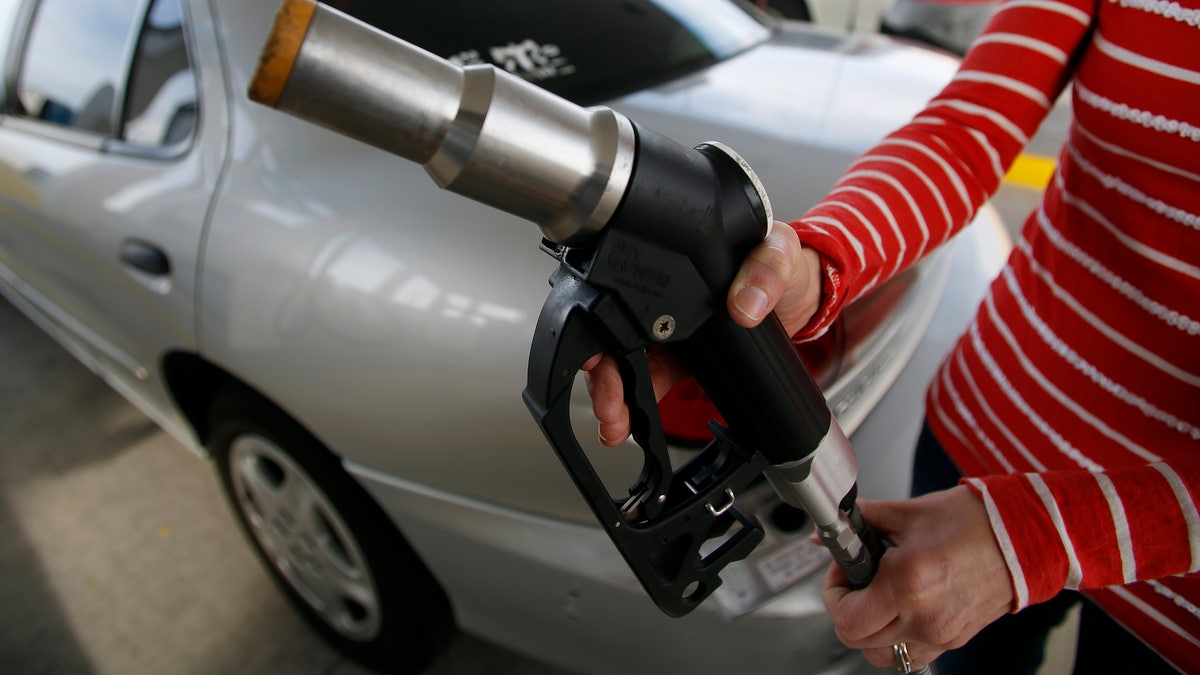
FILE: March 13, 2013: A motorist pumps gas at a Blu LNG filling station in Salt Lake City, Utah. (REUTERS)
Governors in cash-strapped states are revving the motor on efforts to hike the gasoline tax to cover shortfalls or pay for transportation projects -- frustrating drivers, Republican lawmakers and others in a delicate economy.
The tax hikes mean that drivers could soon be paying more at the pump, even if the price of fuel goes down.
Wyoming and California have already approved increases. Wyoming's state gas tax goes from 14 cents to 24 cents a gallon in July and is projected to bring in roughly $70 million in fiscal 2014 for transportation projects. And California regulators last month approved a 3.5-cent hike on its state excise tax that will take effect in July and increase the cost of an average fill-up by roughly 52 cents.
At least 14 other states -- including Maryland, Massachusetts and Minnesota -- have either passed similar increases or are considering them, according to the National Conference of State Legislatures.
Lawmakers have until now been largely unwilling to raise the state gas tax to fund transportation projects -- not only is doing so politically unpopular, but the scheme continues to yield less revenue as a result of more fuel-efficient vehicles and cost-conscious Americans consuming less gas.
Still, Ben Husch, a National Conference of State Legislatures director, said "numerous states" are now moving to beef up their transportation funding stream, and "these states' bold actions may serve as a model for other states grappling with the same issues."
But these "bold actions" come at a cost to motorists.
Maryland Gov. Martin O'Malley is proposing an increase that would vault the state to No. 5 in the country for the amount motorists pay in federal and state gasoline excise taxes.
O'Malley wants to increase the tax by 2 percent starting in July, then by 4 percent in July 2014, as part of a larger plan to pay for a backlog of transit and transportation projects.
The increase, which would raise an estimated $800 million by 2018 to replenish the dwindling transportation fund, faces widespread opposition from state Republicans, consumer advocacy groups and businesses. But at least some form of the bill is expected to pass in the Democrat-controlled legislature.
Based on a Maryland government report, AAA Mid-Atlantic estimates the governor's proposal will increase the state gas tax to 43.7 cents over the next five years -- nearly doubling the current rate.
"The legislation does not hit motorists up for (just) a nickel or dime more per gallon," said Ragina C. Averella, the group's government affairs manager. "The proposal would nearly double Maryland's gas tax by 2018."
Republican state Delegate Susan Krebs agrees that crumbling roads and bridges need repair but doesn't back O'Malley's plan. Among her biggest concerns is that motorists are shouldering the costs and that the fund will continue to be raided for other government needs.
"We're just going back to the same well of motorists," she said. "This is going to hurt Marylanders."
Republican lawmakers appear to be supportive of increases in at least two states.
Michigan Republican Gov. Rick Snyder has proposed changing the gas tax to raise $1.4 billion for transportation projects.
In addition, a commission appointed by Iowa Republican Gov. Terry Branstad last year recommended an increase to the state fuel tax. Branstad has suggested he'd support such an increase in exchange for other tax cuts. But the proposal appears to be losing momentum amid his tepid support.
Virginia's Republican-controlled legislature recently took an alternative approach -- replacing the state gas tax with a series of sales taxes. However, Republican Gov. Bob McDonnell's support of the plan, which now sits on his desk, has made him unpopular with fiscal conservatives.




